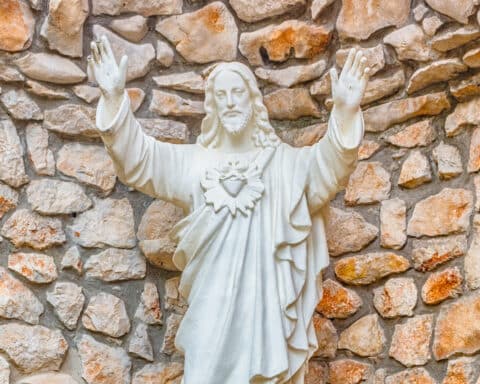The word of God is like seed, the soul like soil.
Church fathers such as St. Basil the Great and Origen talked about something they called the logos spermatikos. A Stoic idea, changed a bit; for theologians like St. Basil the logos spermatikos was a gift given to believers by God, the implanted gift of desiring God. Made by nature, and then by grace, to yearn for God, to say we’re bearers of the logos spermatikos names our spiritual restlessness, explaining why we just can’t help but to seek the spiritual, to seek God, no matter how hard we try not to.
It’s an organic image, earthy. It reminds us that our spiritual restlessness runs deep, that our spiritual and religious lives are woven into our muscles and bones as much as our intellects. That is, we naturally long for God and his nourishment, even in fleshly brokenness, like dry land longs for rain. The spiritual life is not merely academic, intellectual, rational; it’s more. To become religious, to become a believer, requires more than a mere download of information, the examination of evidence. Belief is a more mysteriously natural thing than that; it’s supernatural. Like the growth of a flower, it’s easy enough to explain photosynthesis and its cell biology, harder to explain why it’s so beautiful, why it exists at all.
Planting truth
This fits with what Isaiah says about the word of God. He, too, employs the earthy and organic to talk about the spiritual. As seed makes the earth fruitful, as bread makes the body healthy, “so shall my word be,” the prophet says. Again the image is simple, primitive, reminding us of our more organic spiritual beginnings, that our spiritual awakening began less among the clean philosophers of reason and more among the rustic piety of farmers. It reminds us that spiritual longing is ordinary, that you can be as spiritual as any philosopher or theologian. In one sense, it’s just a simile, just an image; but it is indeed more, for it reminds us that it’s natural, indeed fully human, to be a spiritual person.
| July 16 – 15th Sunday in Ordinary Time |
|---|
|
Is 55:10-11 Ps 65:10, 11, 12-13, 14 Rom 8:18-23 Mt 13:1-23 |
Which, of course, is why Jesus talks like Isaiah, why he, too, speaks in this organic, earthy manner. Because he’s speaking to ordinary people. Jesus is not a political leader, a guru or a philosopher; he’s more a farmer, a sower of seeds. He doesn’t merely offer us information to consider; he plants truth within us. Because his word is seed, and our souls are soil. Because the spiritual life is not merely the life of the mind.
An invitation
Which means what to us though? How does this change the way we think about and live our spiritual lives? Well, it means that when we listen to Jesus talk about “rocky ground” and “thorns” and “rich soil,” we understand that he’s not talking only about some immaterial, mystical, solely intellectual spiritual danger. Rather, he’s talking about everything that hinders or helps us receive the word of God, everything from the most mundane (like our screen addiction, our gluttony, our lust) to the most esoteric and theological (like contemplating the mysteries of the Faith). What obstructs our receiving God’s word? It’s more likely some little comfort that keeps us from praying or serving than, say, some theological or ethical conundrum. Things like that are more likely our rocky ground, our thorns — those everyday things that keep us from God.
The parable is not hard to understand. It simply requires faith. Then one is able to look at oneself to see honestly what’s getting in the way of the word of God; then one is able to see how his or her soul is like soil. Is it choked by worldly anxiety, worldly cares? Is it so distracted and unfocused, so undisciplined and prayerless it can’t really accept God’s word with anything other than shallow joy? The parable is an invitation to examine ourselves, our conscience, and our entire lives. The parable reminds us that everything is on the table, and that we must be honest about it all and let God prune us like the good farmer he is. So that we might grow finally beautiful, just as we were created to be.





